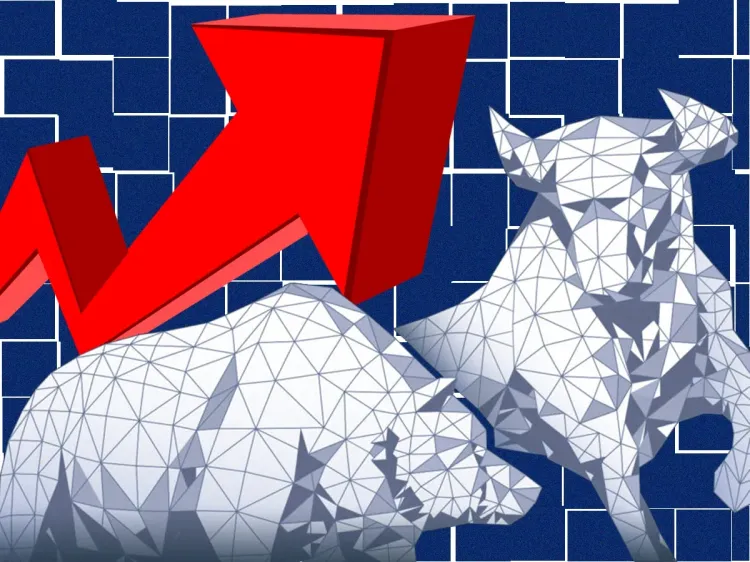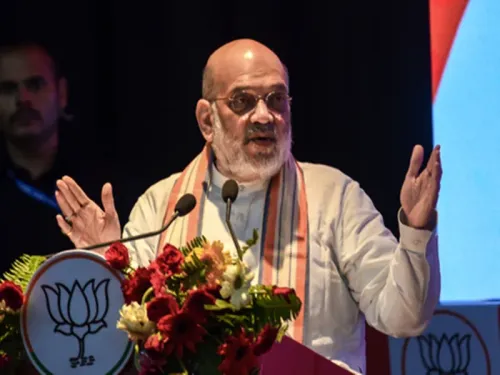Why Did the Sensex Jump Over 1,900 Points Amid Easing India-Pak Tensions?

Synopsis
Key Takeaways
- Sensex jumped over 1,900 points amid easing India-Pak tensions.
- Major sectors experiencing growth included PSU bank, IT, and automobile.
- India's economic resilience is highlighted by its ability to overcome external pressures.
- Trade agreements are crucial for enhancing foreign investments.
- Investor sentiment remains optimistic due to positive global developments.
Mumbai, May 12 (NationPress) The domestic stock indices experienced a remarkable surge on Monday, with the Sensex soaring over 1,900 points during morning trading. This rally was sparked by a reduction in tensions between India and Pakistan, highlighted by 'Operation Sindoor', a significant showcase of India’s military and strategic capabilities.
In the early hours of trading, there was notable buying activity in the PSU bank, IT, and automobile sectors.
At approximately 9:34 AM, the Sensex was up by 1,943 points or 2.45 percent, reaching 81,398.42, while the Nifty Index climbed 598.8 points or 2.49 percent to settle at 24,606.85.
The Nifty Bank index saw an increase of 1,395.95 points or 2.60 percent, bringing it to 54,991.20. Additionally, the Nifty Midcap 100 index was trading at 54,679.55 after a rise of 1,456.20 points or 2.74 percent. The Nifty Smallcap 100 index reached 16,584.60, up by 498.95 points or 3.10 percent.
Analysts indicate that India’s markets and economy exhibit exceptional resilience, consistently overcoming external challenges and geopolitical tensions. This resilience is bolstered by a stable, domestically-focused economy that shields it from global disturbances, demonstrating that every crisis ultimately concludes.
“India's initiatives to establish trade agreements will enhance global business connections, enabling it to boost exports and attract consistent foreign investments, making it increasingly competitive. This, coupled with balanced global relations and robust partnerships, positions India as a relatively secure investment hub,” remarked Devarsh Vakil, Head of Prime Research at HDFC Securities.
Last week, major indexes concluded with mixed results. The announcement of a trade deal between the US and UK, along with reports of US and Chinese officials meeting in Switzerland for trade discussions, fostered a conducive environment for broader negotiations and a reduction in tariffs, enhancing investor optimism, experts noted.
Within the Sensex pack, notable gainers included Adani Ports, Bajaj Finance, Axis Bank, Eternal, Power Grid, NTPC, Bajaj Finserv, Tata Steel, L&T, and SBI. Conversely, Sun Pharma emerged as the sole loser.
Across Asian markets, China, Hong Kong, and Seoul were trading in the positive, while Japan was in the negative.
In the previous trading session on Friday, the Dow Jones in the US saw a decline of 0.29 percent, closing at 41,249.38. The S&P 500 dipped by 0.07 percent to 5,659.91, and the Nasdaq concluded at 17,928.92.
On the institutional front, foreign institutional investors (FIIs), after a streak of 16 consecutive sessions as net buyers, turned net sellers on May 9, offloading equities worth Rs 3,798.71 crore. In contrast, domestic institutional investors (DIIs) continued as net buyers, investing Rs 7,277.74 crore on the same day.









